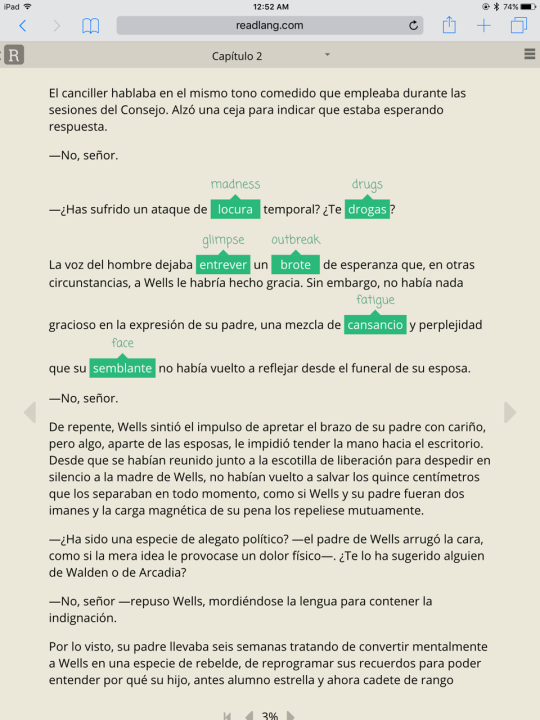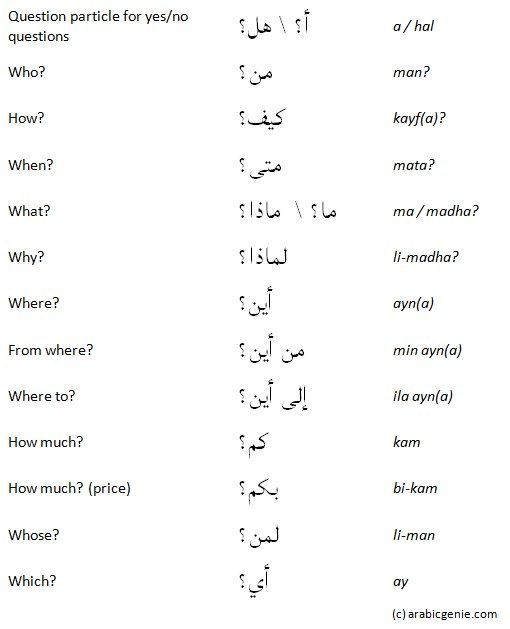Text
Reading in your target language just got so much easier

This cool little website, called readlang, allows you to upload your book, in your target language, from epub form into their website, right? And you just read your book from there. When you don’t know a word, what do you do? Do you go to google dot com and type in that word? Nope. You fucking click it. And it tells you the word.
I am currently reading the 100 (this is the book that the tv show came from) and I can already tell reading this way is so much easier. I highly suggest making an account. It’s free, and works for more than 80 languages!
40K notes
·
View notes
Photo

Arabic question words with their associated English translations - who, when, where, why etc.
665 notes
·
View notes
Text
Arabic cartoon theme songs

سالي
كونان
غريندايزر
أنا وأخي
ريمي
الحديقة السرية
أنا وأختي
عهد الأصدقاء
ايروكا
بائعة الكبريت
الكابـتن مــاجد
بيل و سيباستيان
النمر المقنع
همتارو
ينبوع الأحلام
إيميلي
سانديبيل
بليزنج تينز
دراغون بول
زينة و نحول
83 notes
·
View notes
Text
You can solve a lot of ASL syntax problems, if not most, using five simple tricks.
I found this here
1
First: Learn to start at the beginning. In English the speaker often puts what they feel to be most important first, no matter where it occurs in time.
“I went to the store after I ate breakfast and drank my coffee.”
In ASL you start at the beginning.
>> Breakfast eat. Coffee drink. Store go.
2
Second: Once again the English speaker puts what they feel to be the most important thing first and the next most important piece of information last and miscellaneous information in between. Speakers of English will tend to feel these really are the important things.
However it is interesting to note that every language differs on the things it (and its speakers) considers important. Ownership is very important in English and stressed at every opportunity while in Spanish you do not say “My arm” you say “The arm”. And there is at least one language native to the Americas where it is considered improper to use the word “I”. Thus you would say “This man,” or “This woman” and speak of yourself in the third person. In English speaking of yourself in the third person is considered immature.
ASL has its own priorities. In English you say,
“The wedding took place in a small church in Pittsburgh.”
In ASL you start with the largest item and work down to the smallest.
>> Pittsburgh small-church wedding finish.
3
Third: In English it is often difficult to figure out exactly what is being talked about. Often what the speaker thinks is the most important thing is not treated the same in ASL. English always tends to treat the person who does the action as though they are the most important element –
“She held the small white gloves close to her chest.”
In ASL it is easy. It is the first thing talked about – It is the topic and it starts the sentence. The person being discussed is placed further down the chain of importance.
>> Gloves, small, white, held-close-to-chest (one sign) she (If it is not already understood who is being talked about.)
4
Fourth: In English in order to construct a proper sentence you constantly have to refer to time (using tense, past, present, future) place, and person, in each sentence. English is one of the most repetitive languages in the world. It repeats information over and over again.
“He walked slowly down the hill. It was steep and he did not want to hurt himself. He carefully watched where he stepped.”
In ASL once you establish time, for instance in the sentence above it is the past, it remains the same time (Say yesterday) until you change it.
You don’t need to keep using time indicator such as “ed” “was” “did”.
And the person you are talking about remains the same until you change them, and the place remains the same until you change it. Thus you don’t need to keep referring to “him, he, his”.
Nor do you have to refer back to the place, in this case the hill, with the pronoun “it”. It does not matter how long you talk about them or how many “sentences” you use.
“Hill he walk (show slow careful walking with the sign “walk”) Hurt want not. Use the sign “see” with both hands to show how he watched.
As you can see 7 signs and 1 head shake replace all the words in English, five of which are pronouns.
5
Fifth: Remember that you don’t have “I” this and “I” that in ASL. It is assumed you are talking about yourself unless or until you specify otherwise.
Other people may have other methods. These are the ones I always found most helpful.
(DONT RE-POST IT SAYING IT’S YOUR’S IT’S NOT! This is to help all not to take advantage.)
2K notes
·
View notes
Photo

Memrise
Mondly
Read Arabic!
Arabic Desert
Arabic Keyboard
Madinah Arabic
Arabic Online
Mastering Arabic
Learn Arabic
Learn Arabic
Learn Arabic Online
My Easy Arabic
ArabicSpeaker
Arabic Alphabet
L-Lingo Arabic
ArabicPod101
Arabic101
Digital Dialects
Surface Languages
Internet Polyglot
Goethe Verlang
MyLanguages
ilanguages
ilovelanguages
Omniglot
Wikipedia
Wiktionary
Wikibooks
Wikitravel
381 notes
·
View notes
Text
Useful Expressions in Arabic
These are expressions in MSA (modern standad arabic) I thought that they can maybe help you guys. if you need anything concerning Arabic, just hit me up!
EDIT: i added transliteration
One could say: يمكن القول (yomkeen al-kawl)
A little: قليلا (kalilan)
Alright: حسنا (hasanan)
Be careful: كن حذرا (kon hadiran)
Believe it or not: صدق أو لا تصدق (sadek aw la tusadek)
For example: على سبيل المثال( aala sabil al-mithal)
Good luck: حظا سعيدا (haddan saa’aidan)
Have fun: استمتع(ي) (estamtee’ )
How about: ماذا عن (mada aan)
In the meantime:في الأثناء (fi al-athne)
It doesn’t matter: لا يهم (la yuhem)
Make yourself at home: اعتبر نفسك في منزلك (eetaber nafssek fi manzilek)
No wonder: لا عجب (la aa’ajab)
No problem:لا مشكلة (la moshkila)
Of course:طبعا (tabaa’an)
See you later: إلى اللقاء (ila al-lika)
Thank God:الحمد لله (alhamdulileh)
That’s life: إنها الحياة (ineha al-hayat)
Time will tell: الوقت سيخبرنا (al-wakt sayo5birouna)
Until next time: إلى المرة القادمة (ila al-mara al-kadima)
What a mess: (يالها من) فوضى ((yaleha men) fawda)
(what) nonsense:هراء (hura’)
What’s for lunch: ماذا على الغداء (mada aala al-ghida)
Yet again: لكن مرة أخرى (lakin mara okhra)
You included: أنت ضمنهم (anta demnahom)
You’re kidding me: أنت تمزح (anta tamzah)
Last but not least:آخرا و ليس أخيرا (akhiran wa layssa akhiran)
Not at all:أبدا (abadan)
3K notes
·
View notes
Text
my goal as a polyglot
someone: “so how many languages do you speak?”
me:

1K notes
·
View notes
Text
Reblog with language keyboards you use on your phone
2K notes
·
View notes
Text
Reblog with your native language and the language(s) you would like to learn
it’s for a project I have in mind (kinda)
#english native#I already feel comfortable with spanish#want to learn arabic#ASL#and then maybe thai? idk yet
2K notes
·
View notes
Text
Summer Vocabulary In Arabic

Vacation - عطلة Otlah
Trip-رحلة Rehlah
Ocean - محيط Muheet
Sea- بحر Bahr
Sand - رمل Raml
Beach - شاطئ Shata’
swimming - سباحة Sibaha
Sun - شمس Shamas
Heat - حرارة Hararah
Ice-cream - مثلجات/بوظة Muthaljat
Air conditioner - مكيف هواء Mukaif Hawa’
Hot - حار Har
Sunny - مشمس Mushmes
sunscreen - واقي شمس Waqi-shams
vacation - إجازة Ijazah
a short paragraph about Summer
فصل الصيف
.بعْدَ فَصْلِ الِرَّبيعِ يَأتِي فَصْلُ الحصادِ …..إنهُ فَصْلُ الصَّيْفِ
.في الصَّيْفِ : تَرتَفعُ دَرَجةُ الحَرَارَةِ وتكونُ الشَّمسُ ساطعةً والجوُّ حارّاً والسَّماءُ صافيةً
.يطوُلُ النَّهارُ ويَقَصُرُ اللَّيْلُ . تَنْضُجُ كثيرٌ من الفَواكِهِ والخُضارِ ويجنيِ الفَلاَّحُ ثِمارَ الفاكهةِ
.تَصْفَرُ سنابُل القَمْحِ ويَحْصُدُ الفَلاَّحون حُقولَ القَمْحِ والشَّعيرِ
590 notes
·
View notes
Photo

LEARN SPANISH WATCHING TV SERIES (FROM SPAIN)
As you all may know, watching TV in your target language helps improving the vocabulary, listening comprehension, and knowledge of it in general. This is why I decided to create a masterpost with some of the most well-known TV series in Spain. The titles are clickable, and they redirect to a trailer or some short clip of the show.
(Not following any particular order)
Las chicas del cable: Netflix’s first Spanish original series. It’s set in 1928, and it tells the story of a group of girls working for a telecommunications company. It has this Great Gastby feeling, highly recommended!
Física o química: I’d say this is a low-budget, Spanish version of Skam or Skins, but a bit outdated since it’s from some years ago. But basically same story, the struggles of some high school kids.
Cuéntame cómo pasó: it narrates the daily life of a Spanish family of the second half of the twentieth century, so of course it has some historic episodes going on. It started back in 2001, based in 1968, and it’s still on air, narrating the year 1986.
Aquí no hay quién viva: sitcom which depicts the problems of the neighbours of an apartment building. It stopped being broadcast in 2006, but a new series with basically the same argument and actors emerged, called La que se avecina.
Los hombres de Paco: drama comedy which tells the story of some policemen.
Farmacia de guardia: apparently this is the most watched Spanish TV series ever. It’s a sitcom about a pharmaceutic and her life.
Los Serrano: drama comedy about a family and their struggles.
Vis a vis: a Spanish remake of Orange is the new black, basically.
El ministerio del tiempo: fantasy TV series about a ministry that travels in time.
Velvet: story of love between a heir and a seamstress in the 50s. Miguel Ángel Silvestre (who also appears on Sense8) plays the lead role here.
Sin tetas no hay paraíso: a love story between a posh girl and a troubled guy. Miguel Ángel Silvestre also plays a role here.
El príncipe: drama series of a relationship between a Christian policeman and a Muslim woman.
Aída: sitcom about a poor-ish, low class family and their neighbours.
Águila roja: about a masked hero, set during the 17th century.
La señora: set in the 20s, about a love story between people of two different social classes.
Amar en tiempos revueltos: soap opera depicting the life in the Spanish civil war.
Gran hotel: drama series set in 1905 about a family who own a hotel.
El internado: thriller which focuses on the lives of students living in a boarding room.
Médico de familia: a bit old, tells the story of a doctor and his family.
Hospital central: drama about the lives of some hospital workers.
Verano azul: from 1989, one of the most iconic Spanish TV series. It tells the story of some children and their summer vacation.
If you want to watch any of them and aren’t able to find them (or if you have any doubts), drop me a message and I’ll be glad to help. Happy learning!
Learn Spanish watching TV channels online
Learn Spanish listening to radio stations online
6K notes
·
View notes
Photo


Arabic Vocab List: SCHOOL
|RANDOM|
مدرسة :Madrasa = School.
جامعة: Jāme`a = University.
كلية: Kollīya = College.
درس: Dars = Lesson.
معلم(ة)/مدرس (ة): Mu`allem(a) *or* Mudarres(a) = Teacher (m/f)
مدير/ة: Mudeer/a = Principal (m/f)
ساحة: Sāha = Yard.
طالب/ة: Tālib/a = Student (m/f)
إختبار/إمتحان : Ikhtebār/Imtehān = Exam + Test.
حضور: Hudoor = Attendance.
غياب: Ghiyāb = Absence.
طاولة: Tāwila = Desk/Table.
|SUPPLIES|
دفتر: Daftar = Notebook.
قلم: Qalam = Pen.
مرسام: Mirsām = Pencil.
ورقة: Waraqa = Paper/ Sheet.
حقيبة: Haqeeba = Bag.
آلة حاسبة: Āla Hāseba = Calculator.
محاية: Mahhāya = Eraser.
مسطرة: Mustara = Ruler.
مقص: Maqas = Scissors.
ملف: Milaff = A File.
|SUBJECTS|
جغرافيا: Jughrāfya = Geography.
علوم: `uloom = Science.
رياضيات: Riyadhīyat = Math.
تاريخ: Tārīkh = History.
الفنون: Al Funoon = Arts.
لغة: Lugha = Language.
الأحياء : Al Ahyā’ = Biology.
الكيمياء: Al Kīmya’ = Chemistry.
الجبر: Al Jabr = Algebra
الفيزياء: Al Fīzyā’ = Physics.
قواعد: Qawā`ed = Grammar.
الأدب: Al Adab = Literature.
860 notes
·
View notes
Photo






S L E E P | Arabic
_________
● V O C A B U L A R Y | مفردات
Bedroom| Ghurfat Annawm = غرفة النوم
Bed| Sarir = سرير
Pillow| Makhadda / Wisada = مخدة / وسادة
Pillowcase| Kis Al Makhadda = كيس المخدة
Mattress| Martaba = مرتبة
Bedcover| Ghita’ Assarir = غطاء السرير
Blanket| Battaniya = بطانية
Sleep| Nawm = نوم
Asleep| Na‘em/a = نائم / نائمة
Sleepy| Na`san/a = نعسان / نعسانة
Dream| Hülm = حلم
Nightmare| Kabüs = كابوس
Snore (n.)| Shakhir = شخير
Yawning (n.)| Tatha‘ob = تثاؤب
Nap| Qailüla = قيلولة
Sleepwalking| Assayr Athna’ Annawm /or (Assarnama) = السير أثناء النوم (السرنمة)
Oversleep (n.)| Al Itala fi annawm = الإطالة في النوم
Fast asleep| Müstaghriq/a fi annawm = مستغرق/ة في النوم
Comfortable| Murih = مريح
Cozy(warm)| Dafi’ = دافئ
Alarm clock| Munabbih = منبه
Crib| Sari Tifl = سرير طفل
Cradle| Mahd = مهد
Nightgown| Qamis Nawm = قميص نوم
Pajama| Bijama = بيجامة
Slippers| Khuf/Ni`al/Shibshib = خف/نعال/شبشب
The middle of the night| Müntasaf Allayl = منتصف الليل
Staying up late| Sahar = سهر
Stretching| Tamaddud = تمدد
Insomnia| Al Araq = الأرق
Waking up| Al Istiqaz = الإستيقاظ
__________
● P H R A S E S | عبارات
Good Evening| Masa’ Al Khayr = مساء الخير
Good Evening (Response)| Masa’ Alward = مساء الورد
Goodnight| Tusbih/i `ala khayr = تصبح/ي على خير
Goodnight (Response)| Wa Anta/Anti min Ahlüh = و أنت/أنتي من أهله
___________
● S E N T E N C E S | جمل
I want to go to sleep| Üri Athahab ila Annawm = أريد الذهاب إلى النوم
I want to sleep| Ürid an Anam = أريد أن أنام
I feel sleepy| Ash`ur Binnawm = أشعر بالنوم
I had a nightmare| Halimtu Bi Kabüs = حلمت بكابوس
I feel cosy| Ash`ur Biddif’ = أشعر بالدفئ
This bed is comfortable| Hatha Assarir Murih = هذا السرير مريح
I need a new bedcover| Ahtaj Ghita’ Sarir Jadid = أحتاج غطاء سرير جديد
I should set the alarm clock| `ala yya an adhbüt Al Munabbih = عليا أن أضبط المنبه
I will take a nap| Sa’akhuth Qailüla = سآخذ قيلولة
1K notes
·
View notes
Text
Arabic Resources
*All of these resources are free*
Madinah Arabic Course: There are two sets of course:for those who can read Arabic script and those who cannot. In the course for those who cannot yet read Arabic script you will learn the Arabic alphabet, and slowly learn to read. In the other course you will be able to take 80+ Lessons that go over some of the basics for Arabic.
My Languages: Arabic: Audio. This hasaudio for tons of vocab and also goes over parts of speech like nouns,adverbs,pronouns,articles,etc.
Reed College Arabic Resources: Links to tons of resources including media, such as Netflix movies,newspaper and magazine sites, as well as recommendations for verb conjugator sites, and dictionaries.
Arabic Alphabet Song: Learning the alphabet is crucial to learning any language and having it in song definitely helps
Arabic Alphabet Quiz: This quiz will test you on your ability to identify all the letters and match them to their. This quiz is also timed,so go as fast as you can without sacrificing accuracy!
Writing Practice: THis website has tons of worksheets to practice handwriting and has the letters in all their forms. What I did,to save paper, was print out the pages I needed and put the pages in sheet protectors and I use a dry erase marker to trace the letters as I say their name and sound.
Those are all the free resources I use/know of and I hope to update this as time goes on. Enjoy!
1K notes
·
View notes
Text
Useful Expressions in Arabic
These are expressions in MSA (modern standad arabic) I thought that they can maybe help you guys. if you need anything concerning Arabic, just hit me up!
EDIT: i added transliteration
One could say: يمكن القول (yomkeen al-kawl)
A little: قليلا (kalilan)
Alright: حسنا (hasanan)
Be careful: كن حذرا (kon hadiran)
Believe it or not: صدق أو لا تصدق (sadek aw la tusadek)
For example: على سبيل المثال( aala sabil al-mithal)
Good luck: حظا سعيدا (haddan saa’aidan)
Have fun: استمتع(ي) (estamtee’ )
How about: ماذا عن (mada aan)
In the meantime:في الأثناء (fi al-athne)
It doesn’t matter: لا يهم (la yuhem)
Make yourself at home: اعتبر نفسك في منزلك (eetaber nafssek fi manzilek)
No wonder: لا عجب (la aa’ajab)
No problem:لا مشكلة (la moshkila)
Of course:طبعا (tabaa’an)
See you later: إلى اللقاء (ila al-lika)
Thank God:الحمد لله (alhamdulileh)
That’s life: إنها الحياة (ineha al-hayat)
Time will tell: الوقت سيخبرنا (al-wakt sayo5birouna)
Until next time: إلى المرة القادمة (ila al-mara al-kadima)
What a mess: (يالها من) فوضى ((yaleha men) fawda)
(what) nonsense:هراء (hura’)
What’s for lunch: ماذا على الغداء (mada aala al-ghida)
Yet again: لكن مرة أخرى (lakin mara okhra)
You included: أنت ضمنهم (anta demnahom)
You’re kidding me: أنت تمزح (anta tamzah)
Last but not least:آخرا و ليس أخيرا (akhiran wa layssa akhiran)
Not at all:أبدا (abadan)
3K notes
·
View notes
Text
Middle Eastern Languages
Here is the small list of educational resources about ME languages:
Arabic:
http://www.madinaharabic.com/
http://www.youtube.com/user/arabicpod101/videos and their site http://www.arabicpod101.com/
http://www.arabic-keyboard.org/arabic/arabic-course.php
http://www.learnarabiconline.com/
http://www.studyquran.org/resources/HansWehr-cowan.pdf (dictionary)
sources: http://arabic.desert-sky.net/links.html
Arabic (Iraqi):
http://www.mangolanguages.com/available-languages/learn-iraqi-arabic/
textbook - https://books.google.ru/books?id=99CkzceuZ5wC&lpg=PR14&ots=2cE0ou0x-V&dq=iraqi%20Arabic%20learning&hl=ru&pg=PP1#v=onepage&q&f=false
Arabic (Lebanese):
http://lebanesearabicc.blogspot.co.uk/
Arabic (Syrian):
textbook+mp3 https://archive.org/details/SyrianColloquialArabic
Arabic (Egyptian):
http://egyptianarabiccourse.blogspot.ru/
http://www.lisaanmasry.com/intro_fullweb.html
Persian (Farsi):
http://www.easypersian.com/farsi/
http://www.persiandee.com/
http://www.chaiandconversation.com/
http://www.persianlanguageonline.com/
http://www.omniglot.com/writing/persian.htm this one has links to many other online courses and dictionaries
Persian (Dari):
http://www.omniglot.com/writing/dari.htm
http://mylanguages.org/learn_dari.php
Pashto:
http://mylanguages.org/learn_pashto.php
http://www.hadihairan.com/2011/06/learn-pashto-introduction.html
Kurdish:
http://www.kurdishacademy.org/
Sorani Kurdish:
http://kurdishcentral.org/en/home
http://www.youtube.com/user/skinskin123123/videos
http://www.fas.harvard.edu/~iranian/Sorani/sorani_1_grammar.pdf
Kurmanji Kurdish:
http://www.academia.edu/1238481/Kurmanji_Kurdish_For_The_Beginners_PDF_
http://learnkurmanji.com/
http://www.fas.harvard.edu/~iranian/Kurmanji/kurmanji_1_grammar.pdf
Turkish:
http://www.turkishclass.com/turkish/lessons/turkish_classes.php
http://turkish.pgeorgalas.gr/LanguageEn.asp
http://www.turkishlanguage.co.uk/
Hebrew:
http://www.ulpan.net/
http://hebrew-courses.com/
http://darkwing.uoregon.edu/~ylcflx/Aleph-Bet/index.html
Armenian:
http://www.armeniapedia.org/index.php?title=Armenian_Lessons
http://mylanguages.org/learn_armenian.php
It’s a small list, which includes the most common speaking languages, so I would appreciate if any of you would add more sources about dialects and languages not included.
Also add links to books and courses about languages listed above if you know better sources for learning.
-Lael
343 notes
·
View notes
